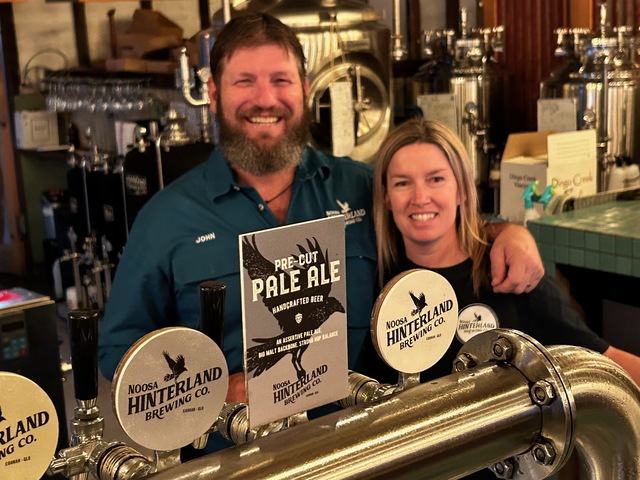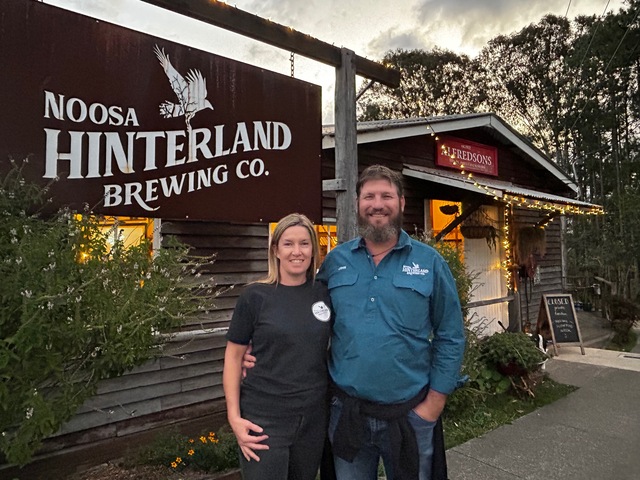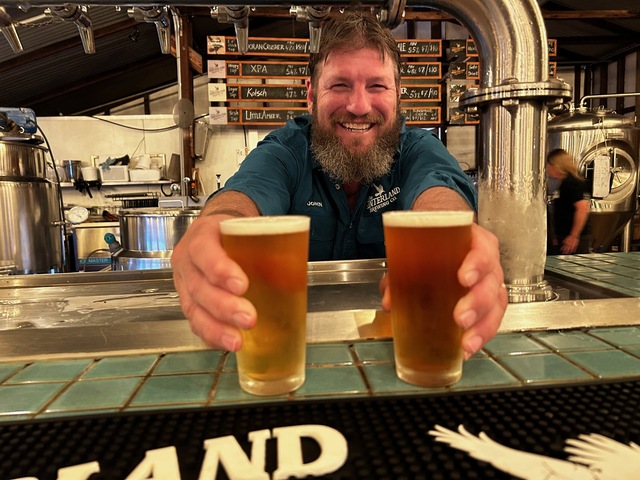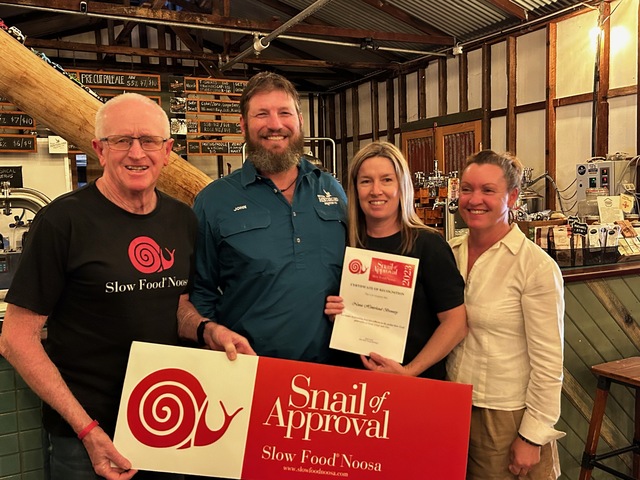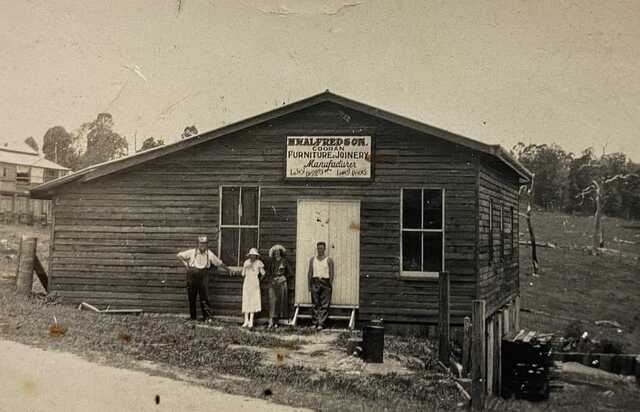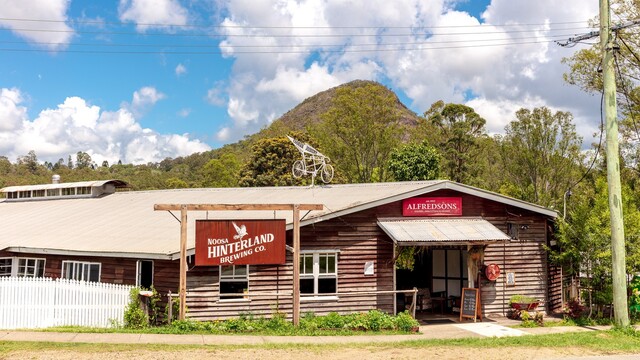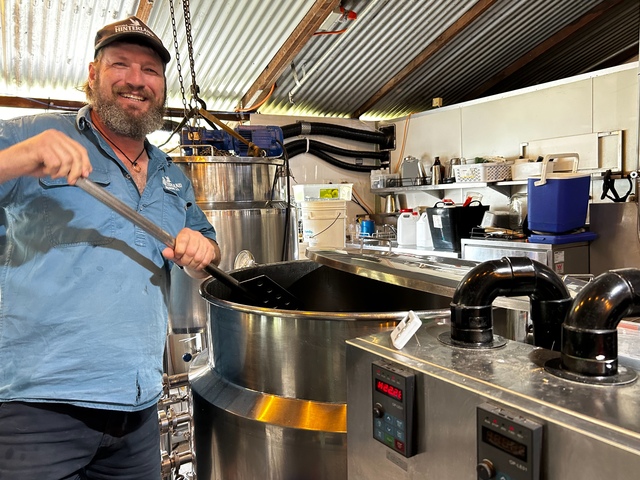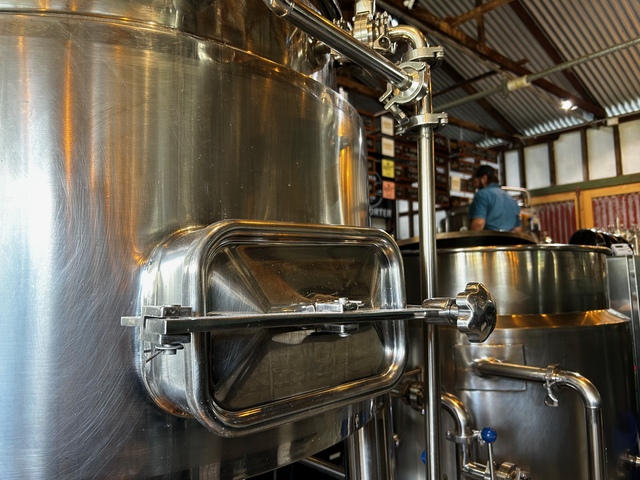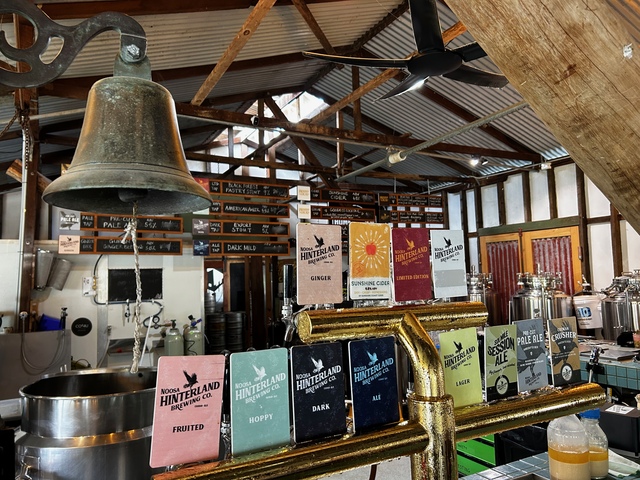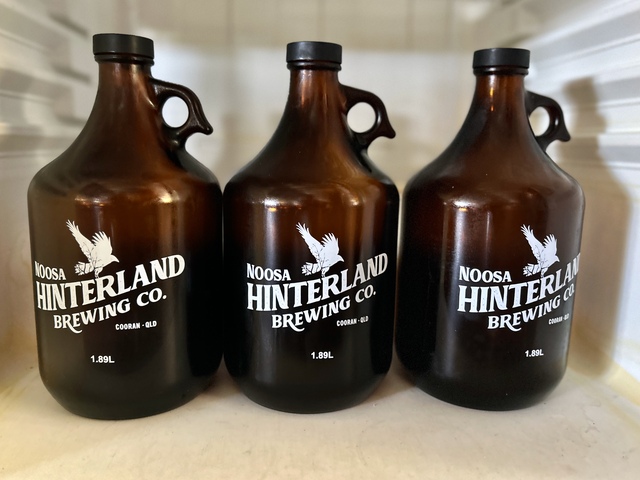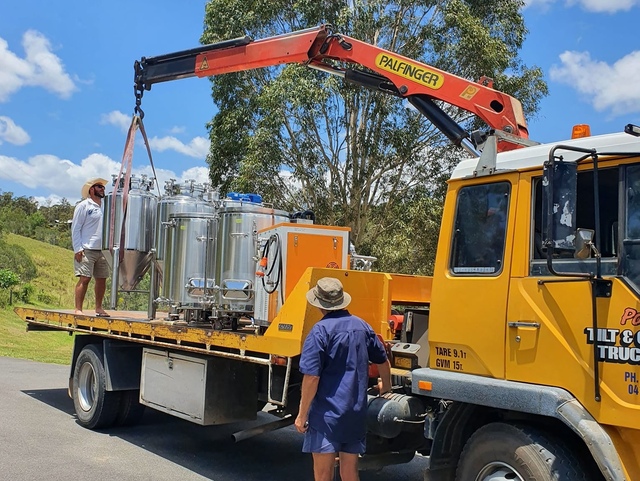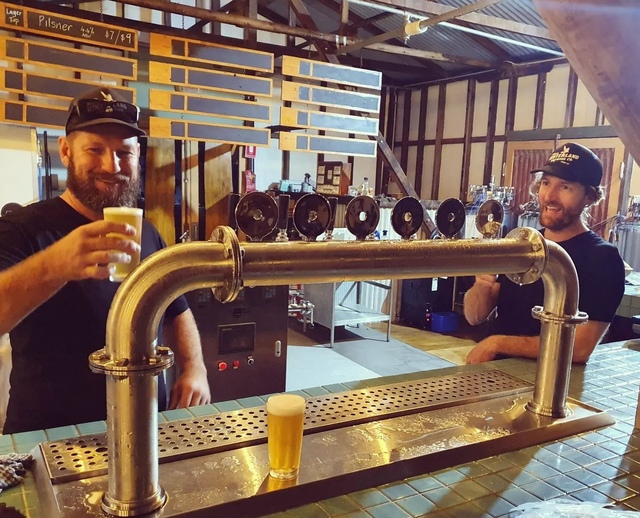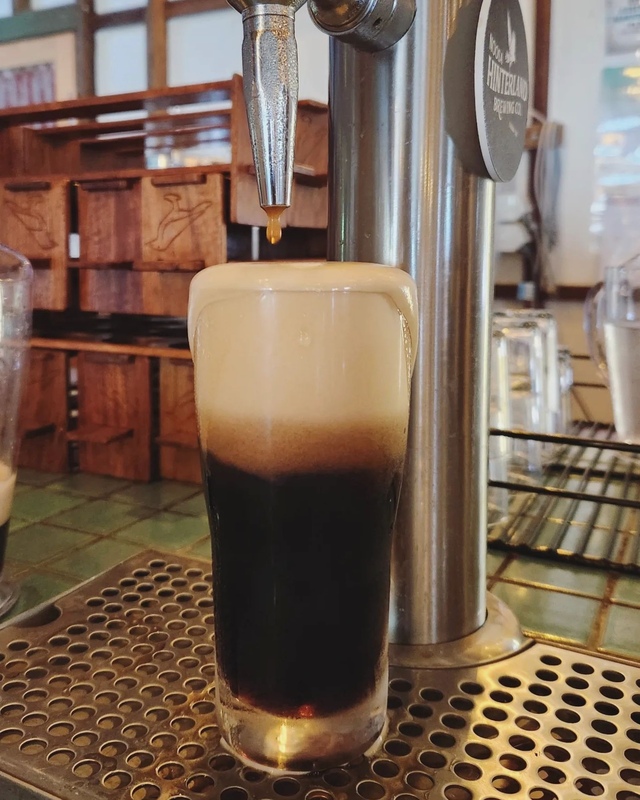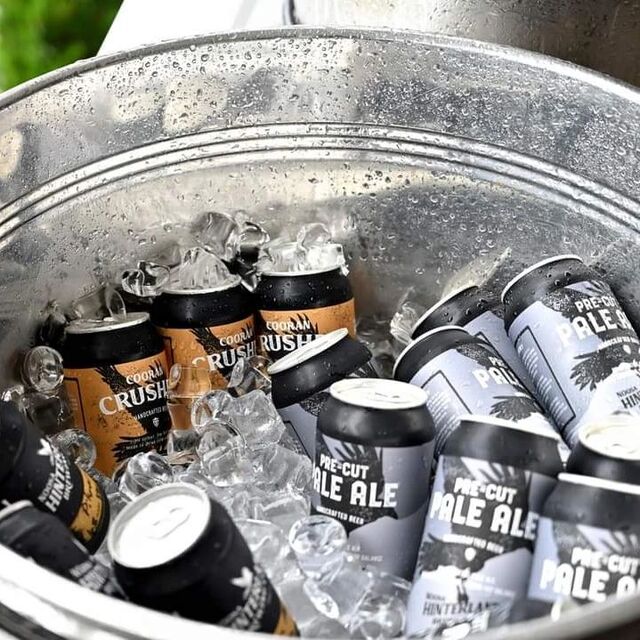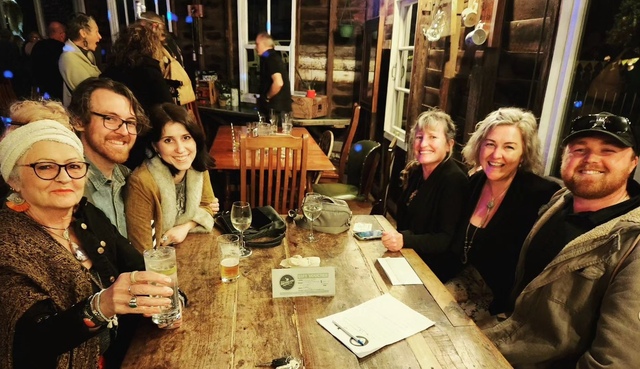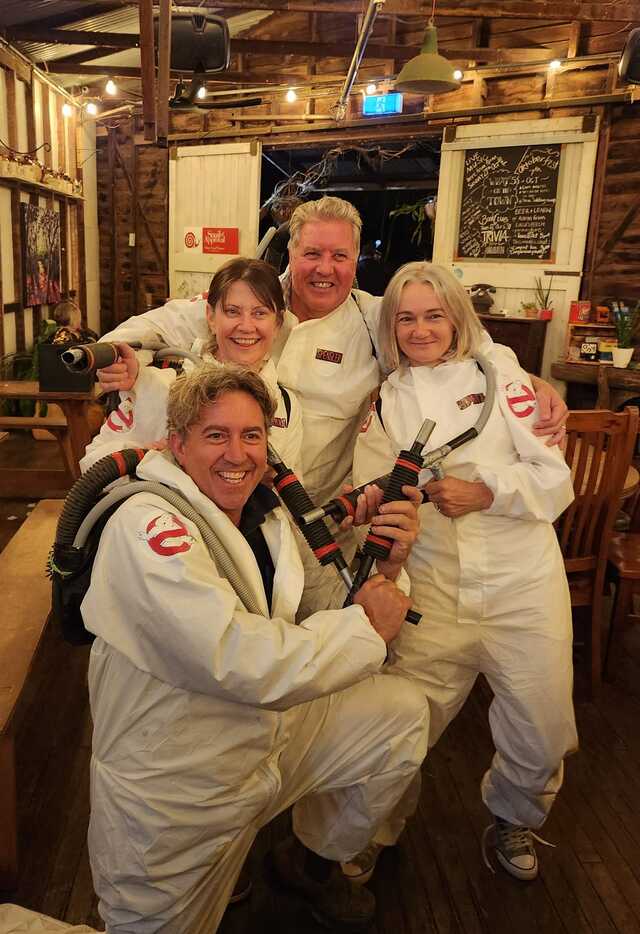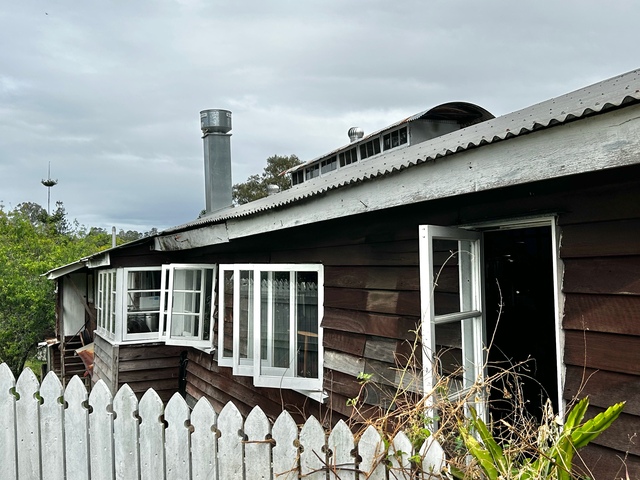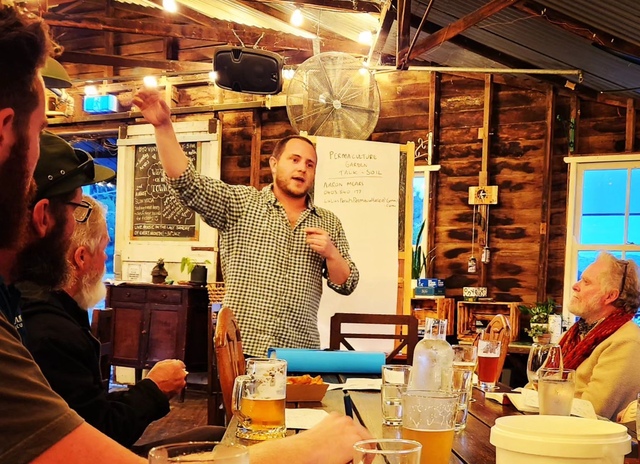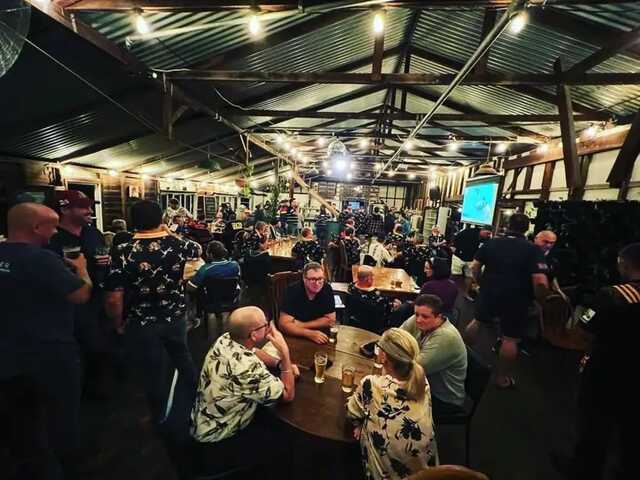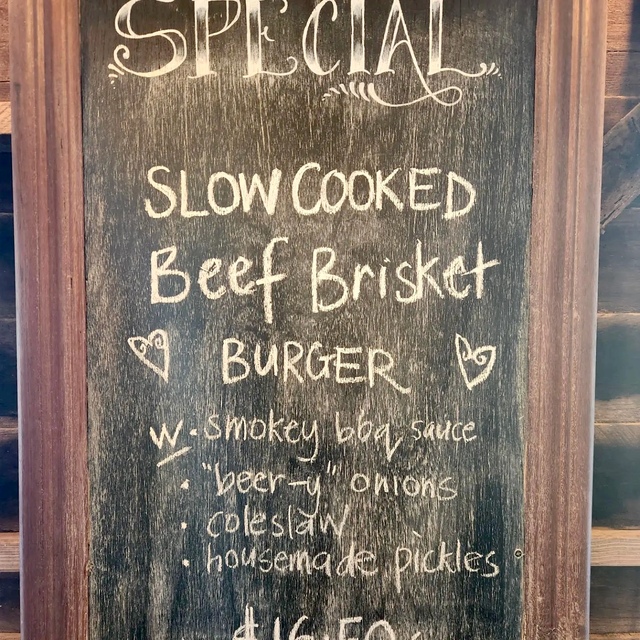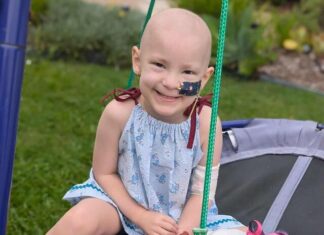It was only natural that John would meet Cara.
Sitting on the verandah of the Alfredson’s Joinery building at Cooran, they tell me about their journey and how they are enjoying operating Noosa Hinterland Brewing Co in this beautiful old landmark.
It was a sliding doors moment … John and Cara Tynan met at a backpackers hostel in South Africa.
He was on his way from Australia to London. She was saving money to return to Australia after having attended university here.
John had grown up in Queensland but studied mining in Western Australia.
He had been to boarding school at Rockhampton. She had gone to university there.
So you can imagine what it was like at that hostel.
“We were both like a spark,” Cara said. “There was this chemistry.”
However, John had already booked to go on to the UK.
Not long after he left, another job came up that Cara thought would be ideal for him – a tour guide.
“I’d been talking about John non-stop, about how much I liked him,” Cara said.
“The role was actually a tour guide that included some game parks.”
Cara had made the phone call from the backpackers and it was to John’s cousin’s number in the UK.
By chance John had just walked in the door. It was at a time before smart phones and the ability to text or have a missed call.
For John, it was to decide whether to try for a career playing rugby union in Ireland or return to Durban.
Growing up in North Queensland, his father was an electrician in mining towns. Most were to the west of Mackay.
After finishing school at Rockhampton, John was intending to be a mining engineer and decided on university at Kalgoorlie in Western Australia.
“Coming from the country, I felt it was too big a step going to a big city so Kalgoorlie suited.
“It was a coming of age in many ways. Some pretty good engineers came out of that.
“It was fascinating to see what’s around at Kalgoorlie – the Super Pit (one of Australia’s largest open-cut gold mines) has been developed from a few smaller mines that have now all joined up.
“I had a couple years working around the goldfields and also wanted to do a bit of travelling before I got too far into it.
“With a working holiday visa for the UK, I went to Africa first and flew into Zimbabwe then went to Zambia, Malawi, Tanzania and Zanzibar for Christmas.”
It was when John tried to catch a boat into Kenya that he realised answering an advertisement for crew was not such a good idea.
The boat kept having mechanical problems, it was full of fleas and finally broke down at an island off the coast of Tanzania.
However, he managed to plane-hop to the port city of Dar es Salaam.
“I had a mate at uni whose parents had immigrated from Durban in South Africa. On a whim I decided to go and see where he grew up.
“That’s why I was working in a backpackers. The owner was Canadian and pretty easy-going.
“There was myself and another Aussie guy from Burleigh Heads, Muzza. We started running it for him and cash began coming in from where it wasn’t before – the pool table, the washing machine, the bar. He couldn’t believe it.
“That’s where I first met Cara. Five days before I was due to fly out to London.”
Cara was born in South Africa and would go to the game parks around Durban each weekend.
“I spent my childhood growing up in a town much like Cooran, not far from the beach and riding bicycles through cane fields.
“I came to Australia on a whim – my auntie was here at Gatton and my grandfather was visiting Perth, so I travelled with him.
“Friends in Sydney suggested I go to uni in Australia, so I made a plan and showed Dad how the sums would add up.
“The South African list included all of my costs but the Australian list didn’t, so he said yes.”
After studying at Rockhampton, Cara worked in hospitality and was allowed 20 hours a week under her visa.
“My first job was at Glenmore Tavern as a kitchen hand – which my parents thought was hilarious.
“I got to prepare the prawn cocktails and even call out the numbers when the dishes were ready … number 232 your meal is ready.
“From there I got job at Hogs Breath. As well as working to pay my rent and food, I kept learning more about business culture and service.”
Back in South Africa, when Cara met John, she had an Australian accent. This surprised him as he knew she had been born in South Africa.
It was then she told him about working in a small town in Central Queensland.
“You won’t know it,” Cara said.
“Try me,” John replied.
“A place called Rockhampton.”
The phone call to John in the UK had a major impact on their lives.
He came back to Durban and as tour guide was taking people on day trip tours to traditional villages. These trips included a small game park – Valley of the Thousand Hills in Zulu homeland.
“I would take a van full of tourists out and drop them at the village, to be shown around, have lunch and be involved in traditional dancing.
“While they were doing that I would get 20-25 kids and jam them in the back and we would go off exploring.”
A few years later, when John and Cara visited again, the children were grown up but still remembered him.
After travelling around South Africa, they both went to the UK and found work at hotels, mostly in Scotland.
John loved the little thatched pubs where you had to bend down to get through the door.
They were very homely and while John started in the kitchen, Cara was a housemaid – again not knowing how this understanding of hotels from the ground up would play out later in their lives.
“It’s good to know every part of the business,” John said. “But there is a difference between hospitality here and in the UK.
“People would come in with their paper and have a chat. It was a meeting place for the community.
“It was very much about sit down and enjoy yourself whereas I had grown up in North Queensland where it was all about standing up to have a drink.
“That is how we would like to think of this place at Cooran, as a part of the community.”
Finally, on a day that counted as sunshine, John realised he had been away for two years.
A program on the BBC, an ABC-TV show about grey nomads travelling around Australia, highlighted his homesickness.
“It showed people waking up, boiling the billy, with magpies and kookaburras singing in the background,” Cara said. “The beautiful tune of the Australian bush.
“John was ready to go home.”
In the late 1990s things were quiet economically in Australia, so John worked at a servo in Brisbane until he could go back to being a graduate engineer.
“We had a VW beetle and we went to Moura, in Central Queensland. I could have gone to WA earlier but didn’t want Cara to be parked in Perth while I worked FI-FO.”
As for Cara, she said that of all the places in the world, she had met this person who took her two hours inland from Rockhampton.
“I had eight months waiting to be allowed to work, so I was a professional volunteer in Moura.
“We had flipped from hospitality and travelling to full-time mining, and I started doing admin work at the mine.”
Two years living in Brisbane were followed by a move to Gunnedah on the Liverpool Plains in New South Wales.
Cara loved it, living on five acres and raising their two children.
Dalby, on the Western Downs was the next shift but John ended up driving back and forth to Brisbane.
By this time he had been through enough corporate work so did subcontracting and that led to them moving to Cooran.
“I had always planned to get out of mining, when the kids would be out of school.
“I’ve seen so many in mining – that’s all they do all their lives. It’s hard on families.
“You might earn a lot of money but it’s not everything.”
While in Brisbane for the second time, Cara completed her Bachelor of Education.
“I wanted to do something very meaningful, especially in the small towns, but we ended up back in Brisbane.
“John had been looking at properties on the North Coast of New South Wales, and at Boonah and Kalbar in the Scenic Rim.
“His mum and dad are at Childers so we had stopped in at Cooran a few times.”
They found a 16-acre property at Traveston that had everything they wanted. A nice house, some remnant rainforest, a dam and bit of a creek.
That was when the Covid pandemic hit and the people who were selling decided to stay for a while.
When the borders opened up they could go travelling, so John and Cara moved to Traveston.
It will be four years in February since they made the shift and John said the universe looked after them from then on.
“Matt Vanderveen had Bonsai Brewhouse here at Cooran – that was our local. I was a home brewer, but it was forming as part of a grand plan.”
They came up for the Cooloola Farm Trail, and met then president of Slow Food Noosa, Jason Lewis at the family’s Cooloola Berries farm.
“It was buzzing, but he took the time to have a chat. We noticed how good they were – and how passionate.
“So we thought about what we do that has passion.”
Cara had achieved what she had wanted in life with teaching, so it was up to John to decide if he was going to make a break from being a mine engineer. If so, what was he passionate about?
“The only thing I could think of was brewing beer … and rugby, but I couldn’t do that.”
John had started building some recipes, and shifting from the extract brews to buying some grain and better brewing gear.
It all happened quickly after that. Covid, the move, Matt was already doing Bonsai Brewing, and John could now travel for mining work.
While Cara was looking at business models, John was still bringing homebrews in, talking to Matt and developing his palate for taste.
“Finally Matt had the opportunity to go to NSW, and asked if I would we be interested in taking this over, even though it was a couple of years earlier than we thought.”
Alfredson’s Joinery and Timberwork in Cooran is a classic building that dates back to the 1930s, and is used for historical society meetings.
John had met Jesse Atkinson at the home brew club in Noosa so they put him on as a brewer.
That worked out nicely and again, it felt as if it was meant to be.
“Jesse was making some really good beers,” John said. “I knew he wanted to do it professionally.
“It was a confluence of things. Teralla Brewing at North Arm had advertised brew kits as they were upgrading to their current kit.
“Everything worked out well. This was even though we didn’t quite know what we were going to do with it.
“So it was stored in the garage along with our other stainless steel equipment. We had moved up from 30 litres to 250 litres.
“All these things came together at the same time.”
It will be four years this October since they started brewing but the business wouldn’t have survived during Covid if John didn’t have mining, Cara said.
“It was hard taking such a risk at the time. It was stressful.
“John was away a lot of the time. And I was getting inundated with the Covid regulations, trying to follow the rules.
“I wanted to be that person in the community – we were new here and had to follow the rules.”
Being on the boundary of Noosa and Gympie councils, brought its problems John said.
Gympie wasn’t part of the Brisbane lock-outs due to distance so people would arrive from Gympie not realising you had to wear a mask in Noosa.
“It was changing all the time. You had to keep up to date, and we were not wanting to get in trouble.”
The people of Cooran knew this was something special, Cara said.
“We could feel that community acceptance. Almost a gratefulness, of having someone here and a place where they could get together – something to hang onto.”
There was one point where they weren’t allowed to open due to Covid restrictions but could do take-aways.
“You could have someone at the bar, another standing in the hallway, and someone else at the door,” John said.
“Everyone came out, it was a social thing. There was a line and we were filling the growler bottles.”
A growler is 64 ounces or a about five small bottles of beer. People would take the bottles away, and that allowed them to catch-up later.
“It meant we had some money coming in,” Cara said, “so we could pay staff whether for brewing or in the kitchen.”
I put it to John and Cara that challenges, when you work through them, can throw up some incredible outcomes.
Yet while tough times can bring out the best in people, Covid also highlighted other issues.
“We just told people we are doing what the laws tell us,” John said. “We are a small family business and in no way looking to fight city lawyers.”
By providing hand-crafted beer and using local ingredients for meals, John and Cara are providing hospitality in the true meaning of the word.
“We were very lucky with the building,” John said. “People like the fact it’s still operating in a true heritage-listed way.”
The building is at the foot of Mt Cooran and is typical Queensland style with an open verandah.
“People love it,” Cara said. “When they walk in the door you watch their faces, and they light up.
“We have two amazing kitchen workers. They are both so passionate and come to us with ideas.”
After joining Slow Food Noosa, John and Cara deliberately tried to source things locally and were granted the Snail of Approval for the ethical way they operated.
Each month they focus on a local producer or business and use local entertainment.
Some of these artists come out of Cooran Acoustic Music night, which has been an institution for more than 30 years.
“We try and support locals,” John said. “There is already a restaurant in town so we don’t want to compete with what’s already existing.”
A specials board for food comprises such items as a cheeseboard, ploughman’s lunch, burgers, tacos or nachos.
“We make beer,” Cara said. “That’s what we want to be best at.
“We want to be good at everything else but our focus is beer.”
It has got to the stage where Noosa Hinterland Brewing at Cooran has reached capacity and they just do keg beer from the tap.
They also supply kegs to Pomona Distilling and to Kin Kin’s Country Life Hotel.
As a consequence John and Cara, Jesse and another Noosa home brewer have established Coolum Brewing Co for wider distribution of their products.
“The pale ale is very hard to keep up with,” John said. “Cooran Crusher and the Six Mile session ale are popular as well but it’s all pale ale at the moment.
“We try to run some seasonal beers – we always have a lager but like to change the style from time to time.
“It can be a bit of an adventure – you can explore it and taste something a little bit different.
“There’ll always be something dark, and something like an English ale. We always have those styles but will change the beer that’s behind it.
“It’s a matter of whatever we can find as well. We are lucky with the Galeru native fruit orchard at Cooroy, especially their Davidson plum.
“We have tried native tamarind and mango beer.”
John and Cara love the satisfaction of providing for people.
“I thought I would miss the challenge of engineering work and managing people,” John said. “I haven’t looked back at all. Not one bit.
“I think it’s enjoying the balance, that’s what we wanted. Not spending our lives working apart and having intermittent time together.”
For Cara, it was a matter of it being fun as well. Not onerous and be considered as a job.
“When customers come in they can feel the joy and comfort of being in a place where we are enjoying it. We want to have a chat with them, swap stories.”
When they started, John thought they would need to be more active with tourists but 60 percent of their business is local.
“You are seeing many of the same faces and that, as business owners, underwrites everything else.
“It’s about building a solid community rather than being reliant on trends and weather.”
Word of mouth is quickly spreading, Cara said.
“We are consistently getting recommendations. That’s nice to see. People respond to seeing a friendly face.
“When you are new you are continually striving to be a part of the community. We were trying different things.”
There’s an element of use it or lose it, John reminded.
“You need to recognise what’s in your back yard.”
Encouraging others to do the same thing and support locals is a part of John and Cara’s strengths.
They have a bingo night, poetry slams and short story readings. There is trivia once a month, usually with a theme and guests dress up.
Paint’n’sip proved popular, there is a book club once a month and a permaculture club.
Every year they do a dark beer festival on the first weekend in July.
“It started as a one-day event and we tried to spread the crowd,” Cara said, “… but we were hammered both days.”
The aim now is for people to understand they are an independent brewing company as opposed to craft beer.
“The big companies have been taking over the craft beers so people are turning away from that,” John said.
“We are not interested in being big. It’s what we can sell through the venue and have a consistent product.
“People expect to come and enjoy a consistent environment. If they have been here before they know they can relax here again.”
It’s a matter of keeping a small village feel, Cara said.
For John, it’s important to employ local people, four days a week.
“I’m brewing three mornings, then there is help with cleaning kegs, working in the kitchen and cleaning.”
This role of supporting locals extends to people being able to find a job in town and gaining experience that can help them later in life, Cara said.
Supporting other businesses has a multiplier effect, as well as retaining and enhancing talent.
Not only that, the sense of community they bring to Cooran seems to be really strong.
As for John and going to Ireland, he hasn’t made it yet … but there is always one day.

